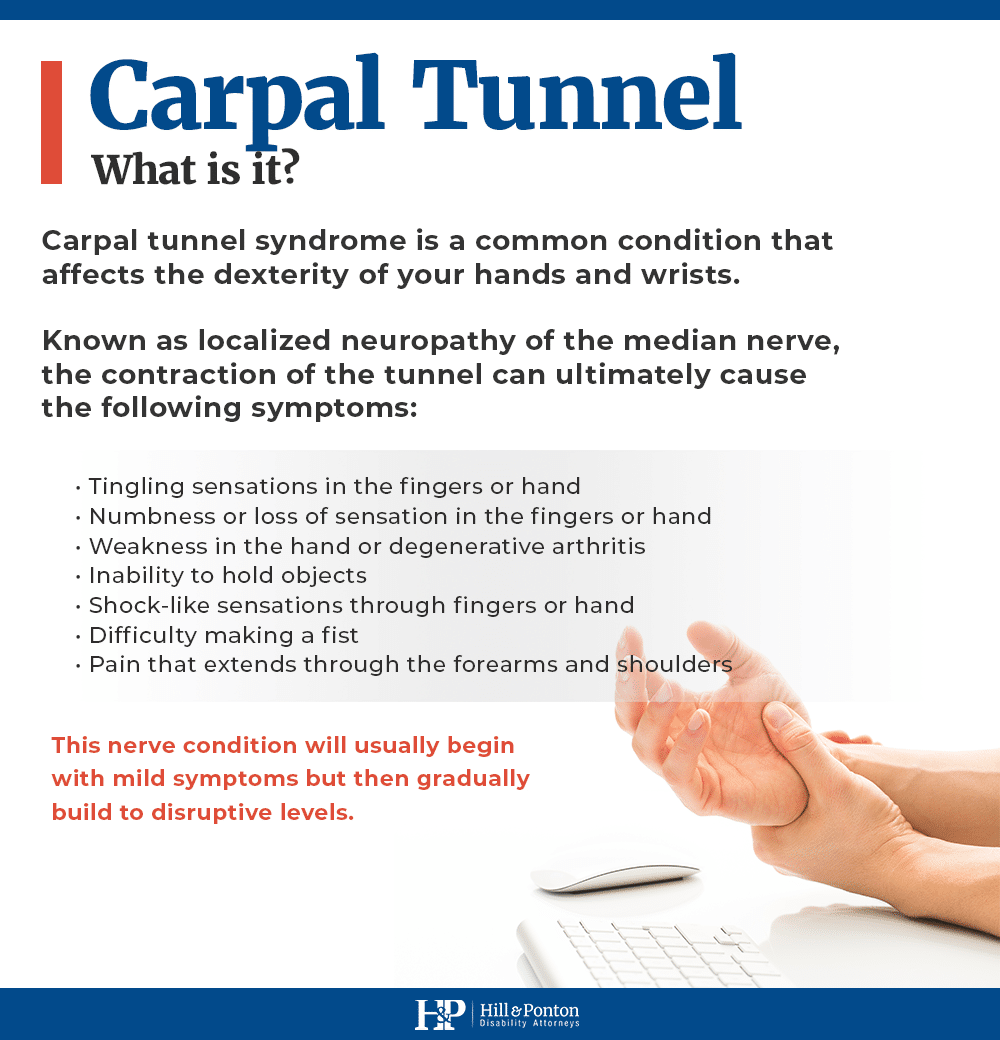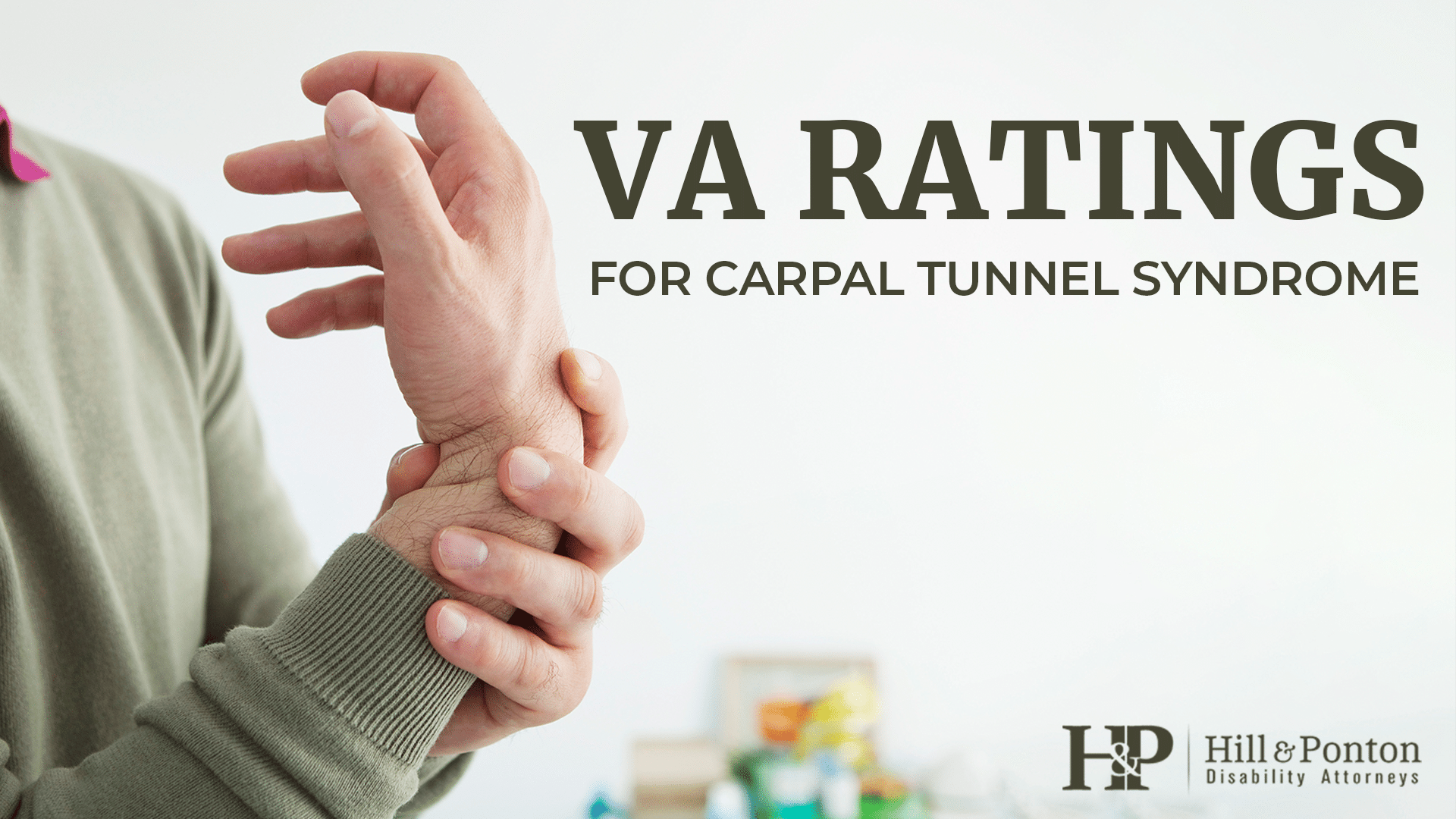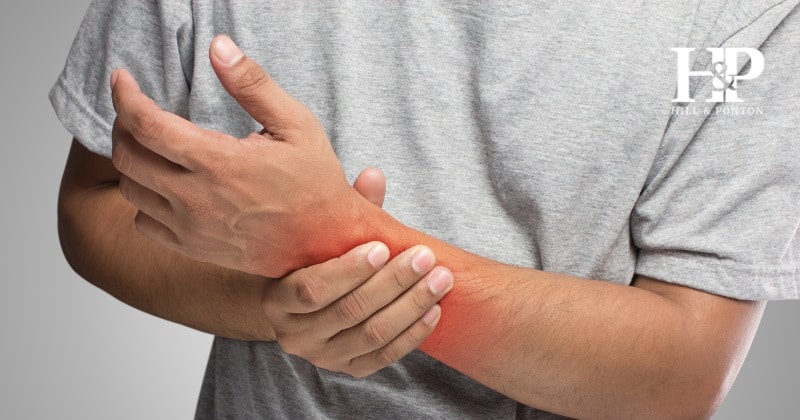Carpal tunnel syndrome significantly impacts veterans, largely due to repetitive wrist and hand motions involved in military roles, such as operating heavy equipment, typing, and extensive manual tasks.
Research indicates that within the U.S. military population, the overall incidence of carpal tunnel syndrome is 3.98 per 1,000 person-years, with a much higher rate for female veterans (8.69 per 1,000 person-years) compared to male veterans (3.09 per 1,000 person-years). The risk of developing CTS increases with age, peaking at 9.08 per 1,000 person-years among those 40 and older. Additionally, senior enlisted personnel and senior officers face higher incidences, potentially due to longer service duration and cumulative occupational exposures.
If you’ve developed carpal tunnel syndrome related to your military service, you’re likely eligible for disability compensation and other benefits through the United States Department of Veterans Affairs (VA).
Service Connecting Carpal Tunnel Syndrome
Connecting carpal tunnel syndrome to military service can be done either directly or by linking it to another condition (as listed out below).
What Causes Carpal Tunnel Syndrome?
Carpal tunnel syndrome results primarily from repetitive hand motions and prolonged wrist flexing or extending. Other health issues may also contribute, including:
- Diabetes
- Rheumatoid arthritis
- Thyroid gland imbalances
- Wrist fractures or trauma
- High blood pressure
Direct Service Connection
To establish a direct service connection, you must provide medical records showing the diagnosis, progression, and treatment of your carpal tunnel syndrome, as well as a strong nexus letter from a medical professional connecting your condition to specific activities or duties performed during military service. Examples of common military tasks that cause carpal tunnel issues include:
- Prolonged typing or computer use
- Mechanical maintenance tasks
- Repetitive handling of heavy equipment, weaponry operation, and other repetitive manual labor
Secondary Service Connection
Secondary service connection applies when your condition arises as a result of another disability already recognized by the VA. For instance, conditions such as arthritis or diabetes that are service connected could lead directly to developing carpal tunnel syndrome.
To establish secondary service connection, you must submit medical evidence that clearly demonstrates a causal relationship between your primary service connected disability and the onset or worsening of carpal tunnel symptoms.
What If the VA Denies Your Case?
If the VA denies your claim for carpal tunnel syndrome, you have the option to appeal the decision. Consider getting assistance from a VA disability lawyer who can fight on your behalf.
What Is the VA Disability Rating for Carpal Tunnel Syndrome?
Carpal tunnel syndrome is rated at 10% or more, depending on the severity of the condition and whether the dominant or non-dominant hand is affected. The VA assesses carpal tunnel syndrome under 38 CFR § 4.124a, specifically Diagnostic Code 8515 for the paralysis of the median nerve.
- Complete Paralysis: 70% rating (dominant hand), 60% rating (non-dominant hand). Symptoms include severe functional impairment like inability to make a fist, loss of thumb movement, and significant muscle atrophy.
- Severe Incomplete Paralysis: 50% (dominant hand), 40% (non-dominant hand). Involves considerable loss of motor and sensory functions.
- Moderate Incomplete Paralysis: 30% (dominant hand), 20% (non-dominant hand). Characterized by noticeable but moderate loss of function and sensory disturbances.
- Mild Incomplete Paralysis: 10% for either hand, presenting with mild sensory symptoms without significant motor impairment.
Bilateral Carpal Tunnel VA Ratings
Veterans with bilateral (both hands) carpal tunnel syndrome typically receive separate disability ratings for each hand. The VA evaluates the severity and functional limitations of each hand independently, assigning an appropriate rating based on the individual impairment level. These separate ratings are then combined, and an additional bilateral factor (an extra 10% of the combined rating) is applied, which can significantly increase the overall disability compensation.
Getting a New VA Rating for Carpal Tunnel After Surgery
Following carpal tunnel surgery, the VA re-evaluates your condition to determine if the surgery successfully alleviated symptoms or if ongoing issues persist. Ratings post-surgery are based on residual symptoms, the effectiveness of your recovery, and how much your hand function continues to be affected. If symptoms such as pain, weakness, or limited mobility remain severe, the VA may maintain a higher disability rating. On the other hand, substantial improvement could result in a lower rating or reassessment at the mild or moderate levels.
How VA Evaluates Carpal Tunnel Syndrome
- Severity and frequency of symptoms: The VA assesses how severe your symptoms are and how often they occur. Severe, constant symptoms typically receive higher ratings compared to mild or intermittent symptoms.
- Dominant versus non-dominant hand: The rating often differs depending on whether the affected hand is your dominant (primary use) hand or your non-dominant hand. Ratings tend to be higher if the dominant hand experiences greater impairment.
- Functional impairment and task performance ability: The VA examines how your condition impacts daily activities, occupational tasks, and overall quality of life. Greater functional impairment typically results in a higher rating.
- A Compensation & Pension (C&P) exam is often required to obtain a VA rating.
What to Expect During a C&P Exam
During a C&P exam, a VA-approved doctor will:
- Conduct detailed physical evaluations to assess the extent of your carpal tunnel syndrome, checking for pain, tenderness, swelling, and signs of muscle weakness or atrophy.
- Perform specialized tests such as X-rays, nerve conduction studies, electromyography (EMG), or dexterity assessments to objectively measure nerve function, hand strength, and coordination.
- Clearly document symptoms, physical examination findings, and observed functional limitations.

Symptoms of Carpal Tunnel Syndrome
- Tingling or numbness in fingers and hands (incomplete paralysis)
- Weakness and inability to grip or hold objects firmly
- Shock-like sensations radiating through fingers or hand
- Difficulty or pain when forming a fist or grasping objects
- Pain extending into the forearm, elbow, or even up to the shoulder
How to Make a Carpal Tunnel VA Claim
To file a successful VA claim for carpal tunnel syndrome you will need to:
- Compile thorough medical records and documentation, including diagnoses, treatment history, physician notes, test results such as nerve conduction studies and electromyography (EMG), and any relevant medical evaluations.
- Secure a nexus letter from a qualified medical professional that clearly and explicitly links your carpal tunnel syndrome to your military service or a service-connected disability (this will not be required if there is documentation of the carpal tunnel syndrome in service records).
- Show how carpal tunnel syndrome affects your daily activities by providing detailed descriptions and examples of functional limitations, such as difficulty performing routine tasks, decreased ability to work, challenges with self-care, or diminished quality of life.
Steps in the Claim Process
- Submit your claim and supporting documents online through the VA’s eBenefits portal, by mail using VA Form 21-526EZ, or in person at your nearest VA Regional Office. If a claim for carpal tunnel syndrome has previously been filed, you will need to file a VA Form 21-0995 with new and relevant evidence.
- Complete a Compensation & Pension (C&P) exam if the VA requests it, ensuring you attend the scheduled appointment and provide comprehensive details about your symptoms.
- Receive a VA decision letter detailing the rating assigned or the reasons for denial.
- If your claim is denied or rated lower than expected, appeal promptly and consider legal assistance.
Get More Benefits with Carpal Tunnel Secondary Conditions
Carpal tunnel syndrome can lead to other health issues that may qualify the veteran for a higher VA disability rating and compensation. The secondary conditions to carpal tunnel syndrome include:
If you’re looking to maximize your VA disability, get in touch with us for a free evaluation of your case. For over three decades, Hill & Ponton has been dedicated to helping disabled veterans nationwide secure the benefits they rightfully deserve.



